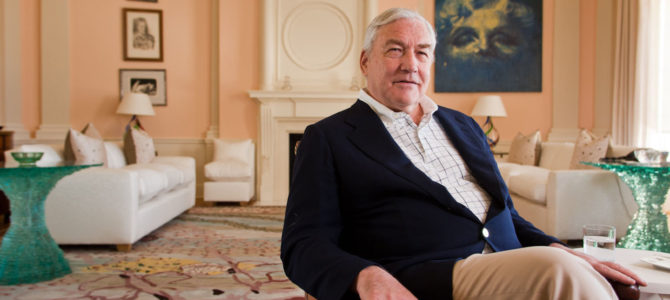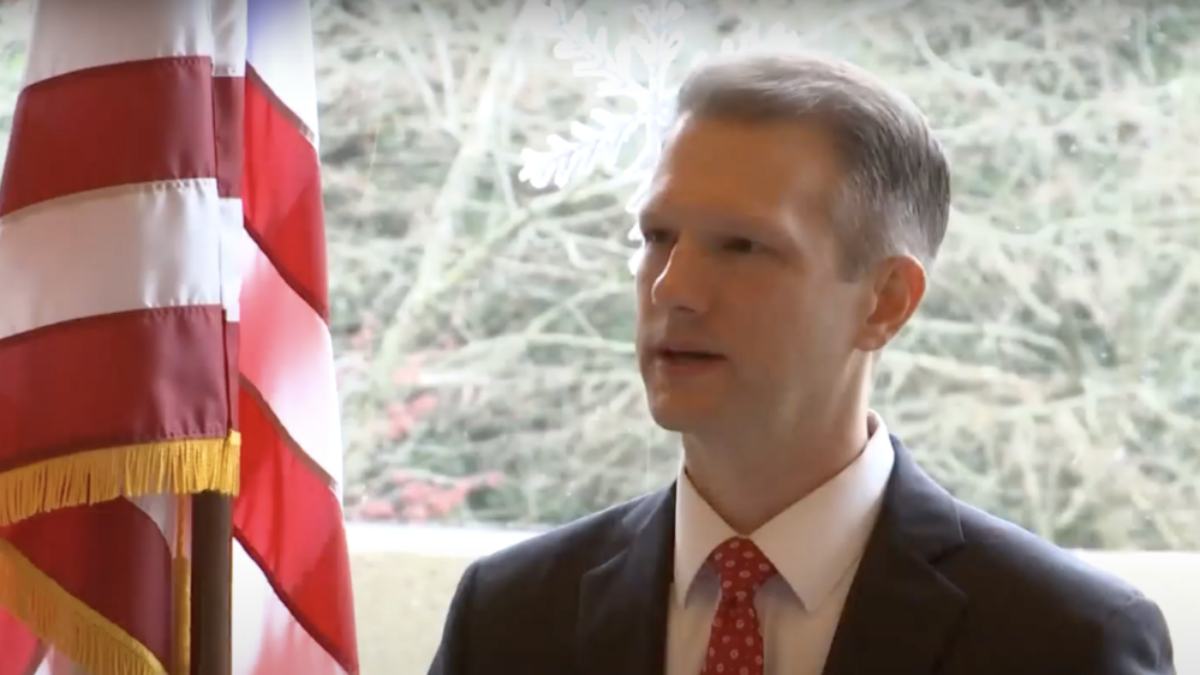
Lord Conrad Black discussed his compelling essay in “Vox Populi” with Federalist Senior Contributor and Senior Fellow at the London Center for Policy Research Ben Weingarten. What follows is a full transcript of their discussion, slightly modified for clarity.
You can also listen to their interview in its entirety below.
Ben Weingarten: “Populism” is a term that’s thrown around often pejoratively in American politics, and even world politics. How do you define it?
Lord Conrad Black: I guess you’re absolutely right. It is bandied about rather loosely. I would say that it is a feeling of alienation by a substantial part of the population that had, at one time, either legitimately aspired to or enjoyed a greater degree of direct attention from people in government and in the political apparatus generally. And it tends to be people who have been either shortchanged on the basis of what they had…they felt legitimate aspirations to expect, or shortchanged on the basis of what they actually received as a deferentially treated section of the polity, the public forum. And it is not revolutionary in character because rarely do such people want to throw out the institutions altogether, or the personnel who direct them. They just want a change in policy, and to the extent, that’s basically a change of personnel.
What you normally get is the arising of such a thing, and then when its presence becomes adequately impossible to ignore, one or other of the established political parties then takes up its cause, at least to some degree, in the hopes of adding its support to what it already has. And I believe this is normally called “fusionism”. Ronald Reagan would agree to that. He took over the Republican Party with a different message from what he represented, as a kind of Tweedledee-Tweedledum performance by those immediately preceding him. And he undoubtedly added a good many people, habitually Independents or from the Democratic side, to the big majorities he won.
And it is the way that, historically, in the United States and some other countries, there are quite sharp changes in public policy outside a transition back and forth between traditional parties, right and left. And I think it’s becoming quite manifest in a number of the leading democratic countries now basically because of the difficulties we’re having finding jobs for everyone in an era when technological advance creates unemployment more than employment, which doesn’t really have a precedent, and in an era when the potentialities of aggressive capitalism create these extraordinary disparities in income greater than we’ve seen before, certainly in the industrial era. And these are challenges to be assimilated by all these political cultures.
You’ve had them in the United States on such occasions as when William Jennings Bryan took over the Democratic Party, calling for bimetallism. And as I put in the essay you mentioned in Vox Populi, the Democratic Party in the five elections prior to him, from 1876 to 1892, won the popular vote or came, on one occasion, within a few thousand of winning it, even though they only won the election twice with Cleveland. But when Bryan took over with his bimetallist faction, their performance deteriorated; and the Republicans won quite easily for some time after that, including three occasions when Bryan himself was the candidate.
But it is a time-honored manner of making a political alliance with a force of considerable discontent that could otherwise become potentially revolutionary, or at least slightly insurrectionist, and bringing it back into the political process and giving it…where it has numbers that justified some sense of being listened to, and contributing to government. That does, in fact, appear to have happened in the last year in the United States. And it’s certainly happened in France.
Ben Weingarten: And I should add, it’s hard to imagine a time where the passions of the body politic would be aroused over a silver versus a gold standard, or all of the above. Hard to imagine that such a time existed in American history.
Lord Conrad Black: It is indeed. It was just one of these peculiar fads, like Prohibition. It became a truism that grew and grew. We had something like that in this country [Canada] at one time, and to a slight degree in the United States, on the theory that if you just had state-owned hydroelectricity, everyone would prosper. There is a weakness, I guess, in all of us, or at least in all nationalities among us, to attach ourselves, in large numbers, to a simplistic formula for a panacea. And of course, experience teaches that they don’t really work usually, but that doesn’t deprive them of their attraction.
Ben Weingarten: In terms of the ideological character of populism today — and I’m thinking here particularly of American populism, although it may extend beyond our borders as well — a question for you: To be a populist in America, do you believe one necessarily need be or ought to be in a sense anti-progressive, given that the elite class, in and of itself writ large, has been marinated in progressivism by dint of the schools the elites attend, the neighborhoods in which they live, and the generally monolithic progressive culture that pervades all of the institutions they inhabit?
Lord Conrad Black: I think that in the way you’re using the word “progressive,” the answer to your question is “yes” because there is this monochromatic uniform view that is politically correct, and populism is almost certain to be to some substantial extent reactive against that. Let us face it, as I’m sure a great many of your listeners would agree, it is an attitude that it is easy to become impatient with. It is so complacent, and frequently so erroneous. In general, of course, I would not, any more than I imagine you would, concede that all progress resides with the left. I would say that is demonstrably not the case.
Ben Weingarten: Yeah, I would say, actually, it’s regress that is dominated by the left. But that’s my editorializing.
Lord Conrad Black: Yeah. And I don’t disagree with it, but you’ve got a current usage question slightly at odds with a semantic question, I guess.
Ben Weingarten: Since you mentioned William Jennings Bryan and the history of populist movements in the U.S., what is it in your view that defines the distinction between President Trump’s populism and populist currents that have come before him in American politics?
Lord Conrad Black: Well, taking Bryan as the most prominent example of it, his ideas simply weren’t practical. He had some interesting elements of, as he would say, a progressive program. I’m no great enthusiast about income taxes, but he was a little ahead of his time in that area. He was somewhat ahead of his time in women’s rights too, including the right to vote. But the idea [of bimetallism] was nonsense. The idea that if you just brought silver, the second precious metal, in to back the currency, everyone would get richer — it was just foolishness. It was just gonna create inflation, that’s all, as you increase the money supply out of any proportion to productivity increases. Now, in fairness, the general subject of economics had not been so thoroughly studied at that time.
But in direct reference to the present Trump phenomenon, he composed a rather artistic combination of traditional conservative views, but sensible conservative views, that he could exploit a nostalgia for and an aspiration for, and added to them a couple of populist flourishes that consisted of a particular emphasis on a couple of points that were not in themselves radical or unheard of or frightening, but from him received greater emphasis, particularly questions of immigration and trade, and to some extent, the imposition of law enforcement.
And these were all ideas that were out there, but he hammered them very hard. He didn’t just take out of thin air a harebrained theory that had never been tried, like bimetallism. He just said, “Look here, we’ve allowed 11 or 12 million people to come into our country, most of them unskilled workers not easily assimilable into our society, including a good many undesirables that other countries in this hemisphere wished to be rid of themselves. And we haven’t even taken their names as they’ve entered. They just came in completely unannounced and unrecorded, and they’re a terrible weight to our social safety net and our education system and so on. This won’t do, countries must have borders.” Now it is so obvious it is hard to imagine that anyone needed to be told that, and I think historians of the United States of the future will be flabbergasted that the political class sat on their hands, both parties, the President’s and the Congress’s, for 20 years or more and allowed these millions of people to come in. It was a shocking lapse in political responsibility, and he finally made the political establishment pay for it.
Ben Weingarten: And you write in your essay of President Trump’s election, that it was only the third time in 100 years that, “The political center moved.” What do you mean by this?
Lord Conrad Black: The others that I was referring to were in 1932 with Franklin D. Roosevelt, and in 1980 with Ronald Reagan. And I believe those three elections are the only ones where there really was a clear demarcation between the outgoing administration and the incoming one, even if it only became altogether clear after the new one was installed.
In, let’s say, the ideological orientation of the administration, Roosevelt, obviously faced with a terrible economic crisis, had a far more government interventionist view of how to get out of that crisis than Herbert Hoover did. And I think they were both in approximately the same socioeconomic group themselves. Roosevelt had a more patrician heritage, but they were both high-income, well-educated men. So it wasn’t that they were at war between themselves in some Marxist class way, they just had a disagreement about how to deal with an unprecedented economic emergency.
In the case of Reagan, there was a strong foreign policy element to it as well, as he believed that the Kennedy, Johnson administrations, and to some degree the Nixon, Ford administrations, had been too accommodating of the Soviet Union. But domestically, he was an advocate of reduced tax and less intervention and smaller government, and to some degree, he was a bit of a confidence trickster, of a very benign and admirable kind. He didn’t really shrink the government very much. Even when he was in office five or six years, he was still running against Washington, the City of Washington and the people in it, and the public sector people, and yet he’d been the president for years. And he was very skillful at doing it. But he didn’t, in fact, seriously undertake a reduction of the role of government. He just changed… Essentially cut taxes, and increased the military capacities and ability to be more assertive politically of the United States very successfully.
In the case of President Trump, again, I think it’s not very difficult to see the change in policy all along the line that he’s conducted from the Obama administration, whether it’s environmental questions, treatment of most foreign policy areas, tax policy, various areas of regulation. It is a sharp change in traditional terms, it’s a change to the right; but not the radical right, just the same sort of right that Reagan talked about and to some degree acted upon.
Ben Weingarten: Yeah, and that Trump agenda, which loosely we can define as — and this is what the National Security Strategy released at the end of last year termed it — a “principled realism” abroad, and at home, an emphasis on sovereignty, the rule of law, and economic nationalism…in your view, does that agenda have staying power? In other words, is Trump’s populist agenda sort of a blip in history that has emerged due to a forceful and charismatic personality, or is there a broader political movement that has real legs?
Lord Conrad Black: Of course, it could go either way, and a lot depends on leadership and more specifically, on how it plays out over the next couple of years. But I believe that it does have legs, and I think it is, on balance, better policy. Let us face facts: The alternative, the policy that he has run against and substantially changed, has been a policy of essentially taking money from people who’ve earned it, and giving it to people who haven’t, with what a very large number consider to be an inadequate criterion of merit, but in a way that coincidentally happens to lead towards the offense of fewer voters than it pleases. That’s essentially what we’re dealing with here.
And if President Roosevelt, who founded the modern social safety network of the United States, had ever seen what it degenerated into, he would have been outraged. He said, “I’m not paying people…” He said that he wouldn’t pay people to be idle. He would if they simply couldn’t work, or we couldn’t find anything for them. But in general, he put people to work in conservation projects, and what would today be called “infrastructure projects.” And they were extremely successful at endowing the country with a great mileage of highways, and many national parks, and great projects like the Lincoln Tunnel and the Triborough Bridge and the TVA [Tennessee Valley Authority] and so on. It was a temporary alternate form of work, and I think it’s been a mistake by American historians to fail to reduce that number of people in his workfare programs from their calculation of the unemployed.
As you know, in more recent times, we’ve had a shrinkage of the workforce, and huge numbers of people simply paid to be idle. And to some degree, it’s a necessity because it is difficult to find work for everyone at a time when most areas of productivity can be accomplished with far fewer people than in the 1930s. But I think what Trump is trying to do is go back to economic growth and fair trading so the U.S. doesn’t just import unemployment in its trade deals, and soak up the unemployed and underemployed that way, and make a more contented and purposeful workforce, and reduce the trade account deficit, and that sort of thing. So I think that is fundamentally a sound policy that will be at least partially successful, and therefore partially durable. I think it would be a terrible mistake and a very sad thing if his policies, economic policy failed. Now there’s no sign of that at this point, but we’re only a year into it now.
Ben Weingarten: Yeah. And you wrote an article towards the end of last year for National Review where you reflected a bit on the president’s first year, and you see a great divergence at its highest level between style and substance, reflected well in kind of the apoplexy and criticism of “The Resistance” on the one hand, and then the actual policies that were promulgated and executed during the year on the other. Reflect for us a little bit on the president’s first year in office as it relates to populism.
Lord Conrad Black: Well, look, I think he’s had the most successful first year since Eisenhower, who ended the Korean War in his first year. And this is disguised by these endless controversies, some of which are created by his deliberately goading his opponents because the tumult seems to amuse him personally. And he is a showman; and he believes, up to a point, that politics is entertainment. And he does make it entertaining — I think even most of his opponents would agree with that.
But the fact is, it’s been a year of considerable achievement. He’s drastically reduced the number of illegal entrants into the country. He’s got a much higher level of cooperation from the Chinese in dealing with North Korea. They have, with allies — but the U.S. playing a very important role in it — effectively smashed ISIS as we knew it. I’m not saying there are no people professing to be ISIS sympathizers around, but they don’t occupy any defined territory in Syria or Iraq as they did. And of course, the economic numbers have been extraordinarily good. And he’s got some of the NATO countries, including Canada, I’m happy to say, raising their defense budgets in accordance with their commitments, instead of just complacently sitting with an American military guarantee, and reducing the whole alliance to talking shop. And all of these things, I think, have worked out well.
And I personally think that he was right not to proceed with the Paris climate agreement, which essentially was based on very questionable scientific analysis, producing a conclusion that would cause the advanced economies, in a very apologetic manner, to enrich less developed countries, who are, in fact, frequently the greatest offenders in environmental matters. And it was just, at least in a large measure, a transfer of money from rich to poor countries in the manner of the long preferred, let’s say, Obama-level model of transferring internal resources from the middle class to people of lower incomes. The Obamas took pretty good care, as the Clintons did, of very wealthy people, who tended to take good care of them too, personally and otherwise.
But the fact is that…I have no standing to mind-read, but it appears that the Clinton camp had terrible problems accepting the fact that they’d lost the election. And as a result of that, given their preeminence in the media, largely because Trump identified the national media as one of the problems, part of the “swamp,” and one of the afflictions of the country and its political system, the Democrats have had no difficulty at all getting solidarity with most of the national media attacking Trump at every conceivable opportunity.
So we’ve had this procession of utterly absurd, preposterous attempts to undermine his presidency, that he had colluded in a treasonable manner with the Russians. Of course, it’s nonsense. There’s not a shred of evidence of it. He wouldn’t dream of such a thing. Or that he’s completely mentally incapacitated — he’s so unbalanced, and therefore, should be removed under the 25th Amendment. Again, this is nonsense. That would have applied at the end of President Wilson’s time after the strokes he had, or something like that, not at a situation like this…The Logan Act, which has never been successfully applied in 219 years, that he improperly conducted foreign policy before he was President, this is nonsense. Obstruction of justice from firing Comey, which he would have no difficulty establishing that Comey richly deserved to be fired after some of the things he did, and I don’t think even Democrats would dispute that now, all of this was just nonsense.
But in this atmosphere of the sort of denial that Trump had won, and therefore, a question about the legitimacy of him being in the White House at all, there’s been this recurrence of attempts to demonstrate that he is either morally or psychologically unqualified to be president. And so we’ve had this red herring of a confected threat to his legitimacy hanging over him, and that has been the chief reason why the atmosphere has been so contumelious. But in fact, his accomplishments as president have been very substantial, and precisely along the lines he promised. Obviously, some of the things he said in his campaign, as is the case with most candidates, successful and otherwise, were exaggerations on what he actually did in office. But in general, he has done what he said he would do, and that in itself is a refreshing change.
Ben Weingarten: The ultimate goal of the litany of charges against the President, as we all know, but which is left unsaid frequently, is to, as you said, undermine his legitimacy, and ultimately, from the Democratic perspective, to try to remove him from office — to create, kind of build the case, real or imagined, and then be able to apply high crimes and misdemeanors, and seek to impeach him. All of the signs look fairly ominous for what will happen at the very least in the House, in the midterm elections, for the Republican Party. What do you anticipate happening if Republicans do, in fact, lose the House?
Lord Conrad Black: Well, I agree. I think they’re trying to either remove him…First of all, sort of taint him and plant this generalized view that there’s something illegitimate about him, and therefore, he shouldn’t receive the respect normally offered to a [president]…Secondly, if they can’t push him out altogether, to distract him so much that he can’t perform properly, so they can then accuse him of being a do-nothing president and a mere controversialist, and have him as a sort of…immobilized president sitting in the White House, awaiting the end of his term.
On your specific question, if the Democrats got control of the House of Representatives, certainly there would be a much greater danger that they would try and put an impeachment bill through. I doubt that…On anything we can see at this point, there would be no really serious reason to do it, other than their own partisanship. And there are some sane people in that party and in their House of Representatives delegation. I think Trump would have to do something that the media could successfully represent as really seriously outrageous before they could get a positive vote. I don’t think they…unless Trump actually committed a crime, which he’s not going to do, has not done and will not do, but unless he did that, they would have less chance of actually getting a vote to remove him in the Senate, a two-thirds vote, than the Republicans had when they tried it with Clinton.
So I think the price we paid essentially for the terrible overreaction to Watergate, accompanied by the fact that Mr. Nixon didn’t handle the investigation properly — I don’t think there is any evidence even now that Nixon himself committed illegalities in Watergate, but some people in his entourage did — but the price we paid for that is the routinization of the criminalization of policy differences. “I don’t agree with this person. We’re imaginative and adaptive Americans. Let’s see if we can avoid this policy option we don’t like, and as a bonus, get rid of this President we don’t like ’cause he’s in the other party” — like accusing him of crimes, as if it was just a confidence vote in a parliamentary system like Britain or Canada. And that is not what the authors of the Constitution intended.
Mr. Nixon was a patriotic man who, in fact, was convinced himself that he did not commit crimes; and if he was judged fairly, would be judged not to have committed crimes. But as a patriot, since impeachment had not been mentioned in the presidential context for over a century, for a president, he just didn’t want to put the country to such a demeaning process. And Bill Clinton had no such reservations, but he did achieve something by showing that it wasn’t a process that would necessarily be very successful. They had not even got that far with Reagan and the Iran-Contra nonsense.
But what should happen at some point soon is both parties, and the powers that be politically in the country generally, should realize that impeachment of a president is something that should be regarded as an absolutely extreme measure, as it was intended to be, in the case of utterly profoundly unconstitutional conduct. It was really designed to prevent a domestic George III coming in. Not that he was that bad a king either, but…he wasn’t. He wasn’t that good either. And he was mad half the time, but he was not a madman…I mean, a mad despot, an autocrat, as he was accused of being. But again, that’s beside the point.
But if the United States — and Alan Dershowitz speaks very well about this, he’s a liberal Democrat who supported Clinton — if the U.S. is going to criminalize in an accelerated and unjust way, or purport to criminalize the conduct of people who are just doing what they said they would do when they ran for election, and then psychiatrize them too, and claim that they’re mentally unbalanced and so forth, you’re going to get chaos in the country. The whole system will break down.
What should happen as a result of all this talk is, have an all-party, nonpartisan resolution and agreement, not legislation, but just a state of mind that is agreed upon, that discussion of the impeachment or removal from office of a president should only be entertained in the event of high crimes and misdemeanors on which there’s real evidence, and not in a routine and frivolous and dangerously irresponsible way, which is what we’ve got now.
[Additionally] I don’t think the Democrats will win the House. I think what will happen is that the President will carefully assemble his healthcare reform that the Republican Party is pretty much agreed upon, and an immigration reform that it’s pretty much agreed upon, put those out very firmly to the voters, stand on his high economic growth and continuing excellent economic numbers, and order the release by the Justice Department, relatively close to the midterm elections, of everything to do with the collusion investigation, to reveal in its ghastly infirmity the absolute vacuity of that argument, the falsity, the malice and the defamatory destructiveness of the entire argument that he or anyone closely associated with him ever colluded with a foreign power to rig an American election. Just administer a bone-crushing defeat to the Democrats, and their echo chamber in the national media. And do it right…just coming into the midterm election campaign. And I think he will gain seats in both the House and the Senate.









